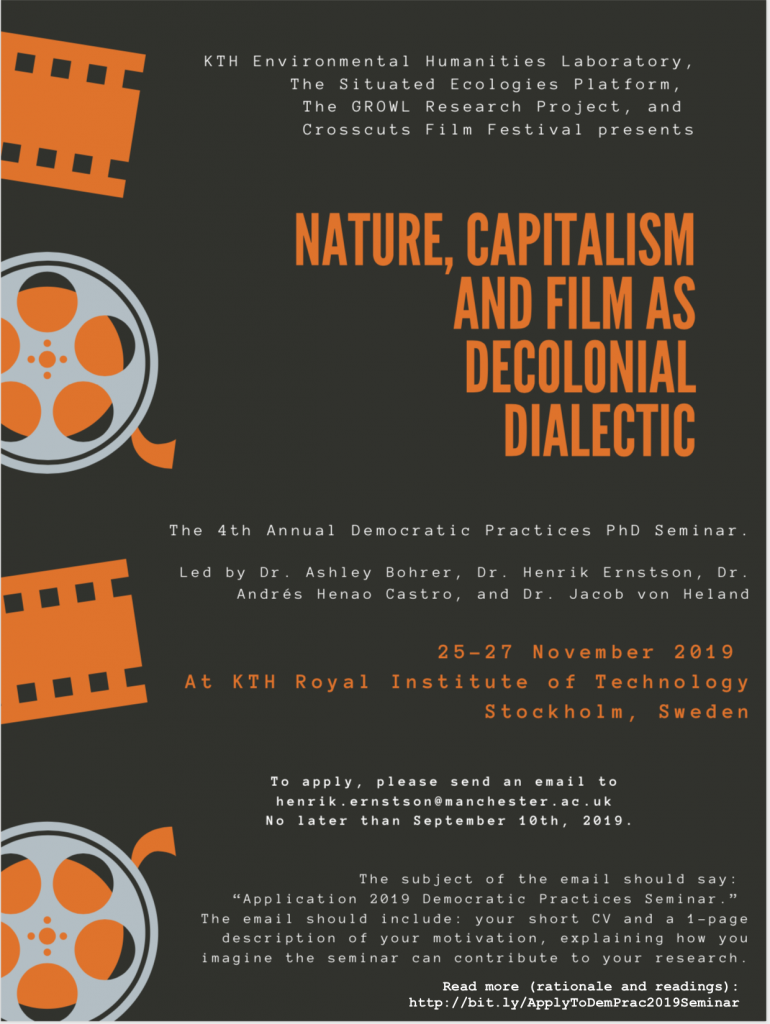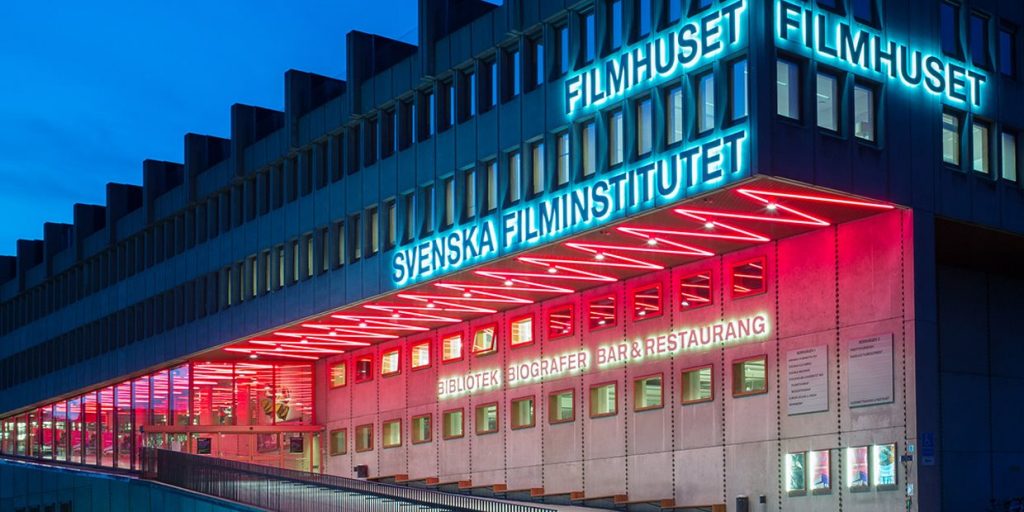This call has now ended. To check out the final course outline, go to the course webpage DemPrac2019!
Date and venue: 25-27 November 2019 at KTH in Stockholm, Sweden (Just after the Crosscuts Film Festival)
Apply to the 4th Annual PhD Seminar in Democratic Practices. This year on “Nature, Capitalism and Film as Decolonial Dialectic” and combine the seminar with the cutting-edge Crosscuts Film Festival in Stockholm. Open for students, scholars, film-practitioners and activists. Send your application no later than September 10, 2019, to Henrik Ernstson (henrik.ernstson@manchester.ac.uk). More information below.

The Democratic Practices Annual Seminar series has taken place since 2015 at the University of Cape Town, combining political philosophy and radical democratic theory with an interest in global south urbanization as spaces of inequality and possibility. This year we combine it with the Crosscuts Environmental Humanities Festival for Film & Text (21-24 Nov) to offer a timely opportunity to reflect on how film, as medium and practice, can offer a critical and decolonial practice. The seminar aims to provide tools and concepts to rethink your ongoing research and projects.
The Seminar will be led by Dr. Henrik Ernstson, political ecologist at The University of Manchester & KTH, Dr. Ashley Bohrer, intersectional feminist from the University of Notre Dame, and Dr. Andrés Fabián Henao Castro, political philosopher from University of Massachusetts Boston. Dr. Jacob von Heland, film-maker and Chief Editor for Crosscuts, will also join.
Venue and host: KTH Environmental Humanities Laboratory, Stockholm. In collaboration with: The Situated Ecologies Platform, The GROWL Research Project, KTH Environmental Humanities Laboratory, and Crosscuts.
Rationale and Aims
This year’s seminar will focus on understanding capitalism in unequal geographies (as in previous years), but also include a critical conversation about film as artistic medium and critical practice. Main questions will be: How does capitalism function in and through its differences across time, space, and social location? How does capitalism interact with and structure gender, race, and sexuality? What use can the critique of capitalism offer for connecting systems of injustice and oppression? How do films and film-making contribute to the performance of that critique? The seminar will unfold through a series of conversations that focus on reading the raced, gendered, and sexualized implications of some of the most crucial structures and concepts of capitalism.
During the first two days we will focus on primitive accumulation and nature. Dr Ashley Bohrer and Dr. Andrés Henao Castro will frame the seminar. They will facilitate an exploration of both the classical Marxist understanding of these concepts as well as the way in which contemporary thinkers of race, gender, sexuality, and their inter-relations have expanded, revised, and, in the words of Frantz Fanon, ‘stretched’ these concepts in order to speak more directly to the lived experience of oppression. This foregrounds multiple vectors of difference and we ask, for example: What role does the racialization of the body play in the capitalist division of use-value from exchange-value? How is the social alienation of labor differentially experienced across gender differences, and in what ways do different modalities of gender assignation/regulation alienate one’s labor? The readings for each day are chosen to provoke questions about how the concepts of primitive accumulation and nature structure geography, space and the city, tying this to discussions about reproductive labour, settler colonialism, and imperial remains.
The third day will be devoted to making linkages between the critical framework we have elaborated during the first two days and the possibilities of film and cinema as a practice of decolonial dialectic and critique. Dr. Jacob von Heland, Chief Editor of Crosscuts, will join Dr. Henrik Ernstson to frame the seminar. We will watch a film together and pair this with discussions and impressions from Crosscuts. In particular we will focus on the work of postcolonial filmmaker and writer Trinh T. Minh-ha who is giving a keynote address at Crosscuts. We will go to Filmhuset in Stockholm where a retrospective of her films are given between November 24-29 and watch one of her films (free admission). In the seminar we will link the experience of watching the film with the chosen texts to elaborate how film and text relate to each other as critical practice. Jacob and Henrik will also draw upon their experiences of developing a film-based critical practice in the environmental humanities (including their cinematic ethnography “One Table Two Elephants” (84 minutes, 2018, CPH-DOX) and upcoming “Provincializing Malfeasance”) and efforts of developing a peer-review publication format for film-based research, the Annals of Crosscuts. While it is not necessary to attend Crosscuts, we recommend that you take the opportunity, which includes keynotes by Trinh T. Minh-ha and Saskia Sassen, and the film “Badiou” by the Kalyan brothers. As a participant you will have free admission to Crosscuts.

Across the three days, we hope to create a space for reflection and discussion on how differences produced and constitutive of capitalism feed off each other to produce forms of oppression. We do this to help historicize a mode of production, demarcate beginnings, imagine ruptures and emancipatory imaginaries. The space will be a chance to rethink foundational aspects of your research, studies and projects.
How to Apply
To apply, please send an email to henrik.ernstson@manchester.ac.uk no later than September 10th, 2019. The subject of the email should say: “Application 2019 Democratic Practices Seminar.” The email should include: your short CV and a 1-page description of your motivation to attend this year’s Seminar and how you imagine it can contribute to your research agenda. Selected participants will be notified by September 20th, and you are expected to confirm your participation in the Seminar no later than October 1st.
We can accept a maximum of 20 participants.
There is no cost to participate in the Seminar. You will also have free admission to Crosscuts. We will offer coffee and tee, and a light lunch one of the days. All other costs are paid by you. This year we have unfortunately no travel bursaries.
Below you will find the reading lists and tips for accomodation and getting around. If you are interested in what we have read and done in the previous years of the Democratic Practices Seminar series, go here.
Best regards,
Henrik, Ashley and Andrés, with Jacob
Schedule and Preliminary Readings
We will meet for 3-4 hours every day in the morning (9:00-13:00/14:00). One of us will frame the seminar during the first 30 minutes: what is at stake; main points of the readings; and where does the texts/films stand in wider intellectual debates. This framing is meant to serve as departure points and provocations towards an engaged discussion, but also facilitate an interdisciplinary group to engage with the texts.
Each day we will have a short 30 minute break two hours into the seminar and then we will return for another 45 minutes to 1 hour of discussion. Coffee and tea will be served during the seminar.
Day 1: Primitive Accumulation (9:00-13:00)
Through a discussion of Marx’ concept of primitive accumulation, we will investigate capitalism’s relationship to that which it frames as its exteriority in both temporal and spatial terms, in order to then interrogate the subject-positionalities that are implicated and potential ways of rethinking that concept today.
Readings:
- Karl Marx. 2006. “Chapters 26, 27, 28, and 33.” In Capital Vol. I. New York: Penguin.
- Saskia Sassen, 2010. “A Savage Sorting of Winners and Losers: Contemporary Versions of Primitive Accumulation.” In Globalizations 7 (1-2): 23-50. NB! Saskia Sassen is a Guest of Honour and Keynote speaker at Crosscuts.
- Federici, Silvia. 2004. “Introduction.” In Caliban and the Witch: Women, the Body, and Primitive Accumulation. New York: Autonomedia.
- Fiona C. Ross. 2015. “Raw Life and Respectability.” Current Anthropology 56 (S11): S97–107.
Day 2: Nature (9:00-14:00)
The second day is devoted to an interrogation of nature’s place within capitalism, the relationship between the human, the non-human, and technology, and the intersectional history of those socially constructed categories and their contested understandings.
Readings:
- Karl Marx. 1993. “Fragment on the Machines.” Grundrisse: Foundations of the Critique of Political Economy. New York: Penguin. (Notebook VI, Notebook VII) p. 690-712. (NB: In the uploaded PDF, the reading starts in the middle of the page with some blank pages in the middle.)
- Jason Moore. 2015. Capitalism in the Web of Life. New York: Verso. Introduction (pp. 1-32) and Chapter 7 (pp. 169-192).
- Françoise Vergès. 2017. “Racial Capitalocene.” Futures of Black Radicalism, edited by Gaye Theresa Johnson and Alex Lubin, 72-82. London: Verso.
Note: There will be a social gathering at a Pub/Bar at 18:00 (Place TBD).
Day 3: Film as Decolonial Dialectic? (9:00-14:00)
The last day brings the two previous days together in a discussion on film as a practice and form to understand capitalism in unequal geographies and decolonial critique. We will watch a film, summarize insights from Crosscuts, and engage the chosen texts to shape a critical discussion where film and text are viewed as equal but different modalities of engaging a contemporary world. In particular we will ask: What decolonial tactics are available in film and text that revolves around ideas of opacity, translation, and resistance to fidelity? What practices have been developed to express and make minority perspectives performative within majority context and settler colonial societies?
Watch together:
- Film by Trinh T. Minh-ha (to be decided).
Readings:
- Pratibha Parmar and Trinh T. Minh-ha. 2013. “Woman, Native, Other: Pratibha Parmar Interviews Trinh T. Minh-Ha.” Feminist Review 36 (36): 65–74.
- Robert Stam, Richard Porton, and Leo Goldsmith. 2015. “An Aesthetics of the Commons.” In: Keywords in Subversive Film/Media Aesthetics. Malden: Wiley Blackwell, pp. 29-67.
- One more text to be added.
All readings will be distributed in a shared folder.
Accomodation and Getting Around
If you need accommodation in Stockholm, there are some good hostels around. You will find a list of hostels here with prices from €20 to €50 per night depending on shared or single/double rooms. We recommend Långholmen hostel, Zinkensdamm hostel, Den röda båten (on a boat); or Skanstull hostel. All lies a 10-20 minute walk from the film festival’s main venue at Bio Rio at Skanstull and with easy access to KTH by subway.
It is easy to get around in Stockholm. In any subway station you can buy an Access card and fill it up. It is valid for the buses as well.
Short on the organizers
Dr. Andrés Fabián Henao Castro is Assistant Professor of Political Science at the University of Massachusetts Boston. Before joining UMB, he was the Karl Lowenstein Fellow at Amherst College, and currently holds a Post-Doctoral Fellowship at the Academy of Global Humanities and Critical Theory at the University of Bologna. His research deals with the relationships between ancient and contemporary political theory, via the prisms of decolonial theory, performance philosophy, and poststructuralism. His current book manuscript criticizes the theoretical reception of Sophocles’ tragedy, Antigone, in democratic theory, queer theory, and the theory of biopolitics by foregrounding the settler colonial logics of capitalist accumulation by which subject-positions are aesthetically distributed in the play and its theoretical reception. His research has been published in Theoria, Theory & Event, Representation, La Deleuziana, Theatre Survey, Contemporary Political Theory, Hypatia: A Journal of Feminist Philosophy, among others. He is also a member of the international research network Performance Philosophy and a columnist for the online journal of political analysis, Palabras al Margen (Words at the Margins), in which he has published extensively on the relationship between politics and aesthetics. For more information, see here.
Dr. Henrik Ernstson is Lecturer in Human Geography at The University of Manchester, affiliated to the KTH Environmental Humanities Laboratory in Stockholm and Honorary Associate Professor at the African Centre for Cities, University of Cape Town with a previous postdoctoral fellowship at the Department of History, Stanford University. He combines political ecology, radical democratic theory and ethnographic practices in his study of urban environmental politics. With co-workers he has developed a situated approach to urban political ecology and founded The Situated UPE Collective and The Situated Ecologies Platform. His recent books include “Urban Political Ecology in the Anthropo-Obscene: Interruptions and Possibilities” (Routledge, 2019; edited with Erik Swyngedouw) that elaborates radical democratic theory in relation to the environmental crises; and “Grounding Urban Natures: Histories and Futures of Urban Ecologies” (Cambridge: MIT Press, 2019; edited with Sverker Sörlin), which combines postcolonial theory and urban environmental studies. He is also developing with Dr. Jacob von Heland a film-based critical research practice, releasing in 2018 the internationally acclaimed cinematic ethnography film “One Table Two Elephants” (84 minutes, 2018, Copenhagen International Film Festival, CPH:DOX) that elaborates the ontological politics of nature in a settler colonial city. His work has been published in Antipode, Environment and Planning A, Theory, Culture & Society, and Urban Studies, among others. See here for publications and profile.
Dr. Ashley J. Bohrer is Assistant Professor at the Kroc Institute for International Peace Studies at the University of Notre Dame. She is a feminist, activist, writer, translator, teacher, and philosopher based in Chicago and explores in her academic work the interstices of philosophy, critical race studies, decolonial theory, intersectional feminism, and Marxism. She holds graduate degrees in both Philosophy and Women, Gender, and Sexuality Studies. She has studied, taught, or held research positions in the United States, France, China, and Germany. In addition to her academic work, Ashley is a committed organizer who works with, among other organizations, International Women’s Strike US, the Center for Jewish Nonviolence, and Jewish Voice for Peace. Her book, Marxism and Intersectionality: Race, Gender, Class and Sexuality Under Contemporary Capitalism (Transcript, 2019) explains how many of the purported incompatibilities between Marxism and intersectionality arise more from miscommunication rather than a fundamental conceptual antagonism. For more information, see here.
Dr. Jacob von Heland is a Research Fellow at the KTH Environmental Humanities Laboratory, co-director of the Situated Ecologies Platform and programmer and Chief Editor of Crosscuts film festival. He is developing a film-based practice in the environmental humanities with previous research in Madagascar, Thailand, South Africa and Kenya. His latest film (with Henrik Ernstson) was the cinematic ethnography “One Table Two Elephants” (84 minutes, 2018, Copenhagen International Film Festival, CPH:DOX) on ontological politics in a settler colonial city. Currently he is editing the essay film “Provincializing Malfeasance” set in eThekwini-Durban (2020, with H. Ernstson) that interrogates the notion of property and owning in settler colonial societies. He teaches cinematic ethnography, human ecology, and science and technology studies.



